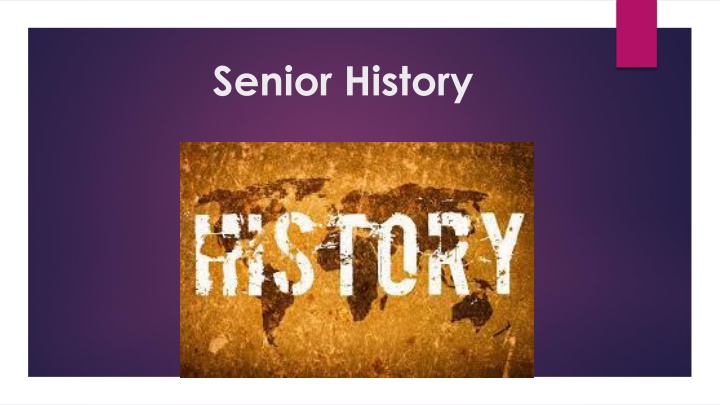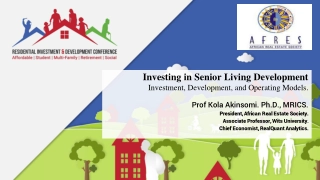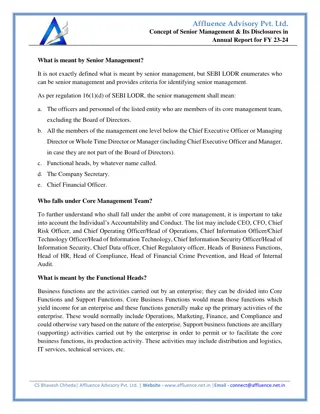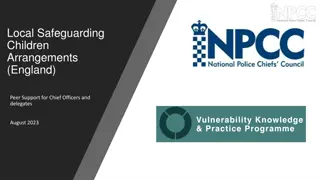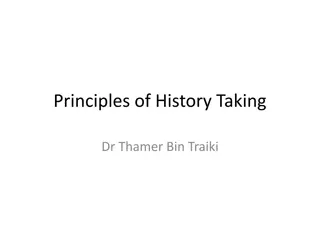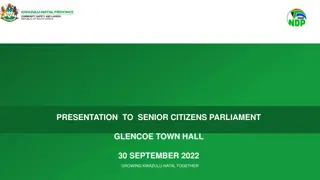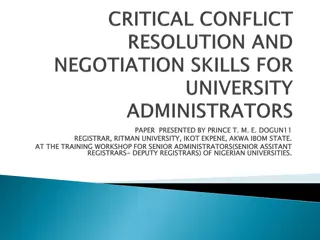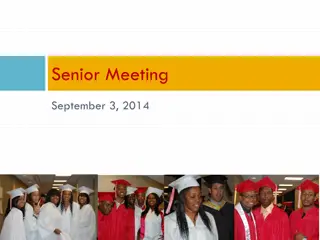Senior History
In the Senior History course, students explore a variety of ideas in the Modern World through historical contexts. They investigate significant concepts like authoritarianism, democracy, imperialism, and more, analyzing their impact on shaping history. The course structure includes units focused on different topics, with assessments like examinations and independent investigations to evaluate students' understanding. Each unit lasts for 15 weeks, providing a comprehensive study of diverse historical themes and events.
Download Presentation

Please find below an Image/Link to download the presentation.
The content on the website is provided AS IS for your information and personal use only. It may not be sold, licensed, or shared on other websites without obtaining consent from the author.If you encounter any issues during the download, it is possible that the publisher has removed the file from their server.
You are allowed to download the files provided on this website for personal or commercial use, subject to the condition that they are used lawfully. All files are the property of their respective owners.
The content on the website is provided AS IS for your information and personal use only. It may not be sold, licensed, or shared on other websites without obtaining consent from the author.
E N D
Presentation Transcript
Course Structure Unit overview Assessment Each unit consists of 2 topics There are 4 types of assessment: Unit 1 and 2 go for 15 week each. Examination Short responses to historical sources Unit 3 and 4 go for 15 weeks each. Investigation independent source investigation Investigation historical essay based on research The topics that have been investigated in the past are in red, however may change depending on the teacher, student interest, and available resources Examination essay in response to historical sources
Unit 1: Ideas in the Modern World Unit description In Unit 1, students form their own knowledge and understanding about ideas that have emerged in the Modern World. The ideas examined include assumptions, beliefs, views or opinions that are of local, national or international significance. They consist of, for example: authoritarianism, capitalism, communism, democracy, environmental sustainability, egalitarianism, imperialism, nationalism, and self-determination. Students apply historical concepts and historical skills to explore the nature, origins, development, legacies and contemporary significance of these ideas within selected historical contexts, e.g. rebellions, restorations, revolutions or conflicts. Examples of key inquiry questions to help guide the course of study in Unit 1 are: To what extent did the ideas under investigation help to shape the Modern World? How did these ideas influence the development of the Modern World? Examples of sub-questions to help guide the course of study in Unit 1 are: What terms, concepts and issues are linked to the ideas under investigation? Why did these ideas occur? When, why and how did individuals, groups, events or other factors contribute to the development of these ideas? To what degree did conditions remain the same or change while these ideas developed? How have historians or other commentators interpreted contestable and historical features linked to these ideas?
Unit 1: Ideas in the Modern World Unit requirements Two topics are studied in this unit. One of these must be Topic 1, if Topic 1 in Unit 2 (Australian Indigenous rights movement since 1967) is not studied. The topics that may be selected are: Topic 1: Australian Frontier Wars, 1788 1930s (First Fleet arrives in Australia Caledon Bay Crisis ends) Topic 2: Age of Enlightenment, 1750s 1789 (Encyclop die published French Revolution begins) Topic 3: Industrial Revolution, 1760s 1890s (Spinning Jenny invented Kinetoscope developed) Topic 4: American Revolution, 1763 1783 (French and Indian War ends Treaty of Paris signed) Topic 5: French Revolution, 1789 1799 (Estates General meets New Consulate established) Topic 6: Age of Imperialism, 1848 1914 (Second Anglo-Sikh War begins World War I begins) Topic 7: Meiji Restoration, 1868 1912 (Meiji Government established Emperor Meiji dies) Topic 8: Boxer Rebellion, 1900 1901 (Boxer militancy in Pingyuan begins Boxer Protocol signed) Topic 9: Russian Revolution, 1905 1920s (Bloody Sunday takes place Russian Civil War ends) Topic 10: Xinhai Revolution, 1911 1912 (Wuchang Uprising begins Emperor Puyi abdicates) Topic 11: Iranian Revolution, 1977 1979 (anti-Shah demonstrations take place Iran becomes an Islamic Republic) Topic 12: Arab Spring since 2010 (Tunisian Revolution begins)
Unit 2: Movements in the Modern World Unit description In Unit 2, students form their own knowledge and understanding about movements that have emerged in the Modern World. The movements examined include actions or activities on a local, national or international level that are directed towards a particular social purpose. Often the social purpose has been to make the world more inclusive, liberal, equitable, egalitarian or accessible through the removal of discrimination and exploitation based on some form of prejudice, e.g. ableism, anti-Semitism, classism, homophobia, Islamophobia, racism, sexism, transphobia or xenophobia. Students apply historical concepts and historical skills to explore the nature, origins, development, legacies and contemporary significance of these movements within selected historical contexts, e.g. movements for independence, civil rights or some other form of political and social change. Examples of key inquiry questions to help guide the course of study in Unit 2 are: To what extent did the movements under investigation help to shape the Modern World? How did these movements influence the development of the Modern World? Examples of sub-questions to help guide the course of study in Unit 2 are: What terms, concepts and issues are linked to these movements under investigation? Why did these movements occur? When, why and how did individuals, groups, events or other factors contribute to these movements? To what degree did conditions remain the same or change while these movements developed? How have historians or other commentators interpreted contestable and historical features linked to these movements?
Unit 2: Movements in the Modern World Unit requirements Topic 6: Independence movement in Algeria, 1945 1962 (demonstrations in Setif begin Algerian independence declared) Topic 7: Independence movement in Vietnam, 1945 1975 (Vietnamese independence declared Saigon falls to North Vietnamese forces) Topic 8: Anti-apartheid movement in South Africa, 1948 1991 (apartheid laws start apartheid laws end) Topic 9: African-American civil rights movement, 1954 1968 (judgment in Brown v. Board of Education delivered Kerner Report published) Topic 10: Environmental movement since the 1960s (Silent Spring published) Topic 11: LGBTIQ civil rights movement since 1969 (Stonewall Riots begin) Topic 12: Pro-democracy movement in Myanmar (Burma) since 1988 (People Power Uprising begins) Two topics are studied in this unit one of which must be Topic 1, if Topic 1 in Unit 1 (Australian Frontier Wars, 1788 1930s) has not been studied previously. The topics that may be selected are: Topic 1: Australian Indigenous rights movement since 1967 (Australian Referendum of 1967 takes place) Topic 2: Independence movement in India, 1857 1947 (Sepoy Rebellion begins Indian Independence Act 1947 becomes law) Topic 3: Workers movement since the 1860s (Great Shoemakers Strike in New England begins) Topic 4: Women s movement since 1893 (Women s suffrage in New Zealand becomes law) Topic 5: May Fourth Movement in China, 1919 (Student protests at Beijing University begin Victory of the People published)
Unit 3: National experiences in the Modern World Unit description In Unit 3, students form their own knowledge and understanding about national experiences that have emerged in the Modern World. The national experiences examined include crises that have confronted nations, their responses to these crises, and the different paths nations have taken to fulfil their goals. These national experiences consist of, for example: civil wars, immigration policies, electoral campaigns and major economic events. Students apply historical concepts and historical skills to explore the nature, origins, development, legacies and contemporary significance of these national experiences within selected historical contexts. Examples of key inquiry questions to help guide the course of study in Unit 3 are: To what extent did the national experiences under investigation help to shape the Modern World? How did these national experiences influence the development of the Modern World? Examples of sub-questions to help guide the course of study in Unit 3 are: What terms, concepts and issues are linked to the national experiences under investigation? Why did these national experiences occur? When, why and how did individuals, groups, events or other factors contribute to these national experiences? To what degree did conditions remain the same or change while these national experiences developed? How have historians or other commentators interpreted contestable and historical features linked to these national experiences
Unit 3: National experiences in the Modern World Unit requirements Topic 6: United States of America, 1917 1945 (entry into World War I World War II ends) Topic 7: Soviet Union, 1920s 1945 (Russian Civil War ends World War II ends) (Year 2) Topic 8: Japan, 1931 1967 (invasion of Manchuria begins National Foundation Day takes place) (Year 1) Topic 9: China, 1931 1976 (invasion of Manchuria begins Cultural Revolution ends) Topic 10: Indonesia, 1942 1975 (Japanese occupation begins invasion of East Timor begins) Topic 11: India, 1947 1974 (Indian Independence Act of 1947 becomes law India explodes its first nuclear device) Topic 12: Israel, 1948 1993 (Israeli independence declared Oslo Peace Accords signed) Topic 13: South Korea, 1948 1972 (Republic of Korea begins Third Republic ends). Two topics are studied in this unit. The topics that may be selected are: Topic 1: Australia, 1914 1949 (World War I begins Robert Menzies becomes Prime Minister for the second time) Topic 2: England, 1756 1837 (Seven Years War begins reign of Queen Victoria begins) Topic 3: France, 1799 1815 (Coup of 18 Brumaire begins Hundred Days end) Topic 4: New Zealand, 1841 1934 (separate colony of New Zealand established Reserve Bank of New Zealand established) Topic 5: Germany,1914 1945 (World War I begins World War II ends)
Unit 4: International experiences in the Modern World Unit description In Unit 4, students form their own knowledge and understanding about international experiences that have emerged in the Modern World. The international experiences examined include responses to cultural, economic, ideological, political, religious, military or other challenges that have gone beyond national borders. They consist of situations where, for example, two or more nations or regional groups: come into conflict with each other (directly or via proxies); form a common union, treaty or commerce-based arrangement; engage with a subnational or transnational organisation; experience the effects of a global or regional trend. Students apply historical concepts and historical skills to explore the nature, origins, development, legacies and contemporary significance of these international experiences within selected historical contexts. Examples of key inquiry questions to help guide the course of study in Unit 4 are: To what extent did the international experiences under investigation help to shape the Modern World? How did these international experiences influence the development of the Modern World? Examples of sub-questions to help guide the course of study in Unit 4 are: What terms, concepts and issues are linked to the international experiences under investigation? Why did these international experiences occur? When, why and how did individuals, groups, events or other factors contribute to these international experiences? To what degree did conditions remain the same or change while these international experiences developed? How have historians or other commentators interpreted contestable and historical features linked to these international experiences?
Unit 4: International experiences in the Modern World Unit requirements Two topics are studied in this unit. QCAA will nominate one topic from the list below that will be the basis for external assessment. Schools will be notified of the topic at least 12 months before the external assessment is implemented. Schools must then choose an alternative topic from: Topic 1: Australian engagement with Asia since 1945 (World War II in the Pacific ends) Topic 2: Search for collective peace and security since 1815 (Concert of Europe begins) (Year 1) Topic 3: Trade and commerce between nations since 1833 (Treaty of Amity and Commerce between Siam and the United States of America signed) Topic 4: Mass migrations since 1848 (California Gold Rush begins) Topic 5: Information Age since 1936 (On Computable Numbers published) Topic 6: Genocides and ethnic cleansings since the 1930s (Holocaust begins) Topic 7: Nuclear Age since 1945 (first atomic bomb detonated) Topic 8: Cold War, 1945 1991 (Yalta Conference begins Soviet Union ends) (Year 2) Topic 9: Struggle for peace in the Middle East since 1948 (Arab-Israeli War begins) Topic 10: Cultural globalisation since 1956 (international broadcast of the 1956 Summer Olympics in Melbourne takes place) Topic 11: Space exploration since 1957 (Sputnik 1 orbits the Earth) Topic 12: Rights and recognition of First Peoples since 1982 (United Nations Working Group on Indigenous Populations established) Topic 13: Terrorism, anti-terrorism and counter-terrorism since 1984 (Brighton Hotel bombing takes place).
